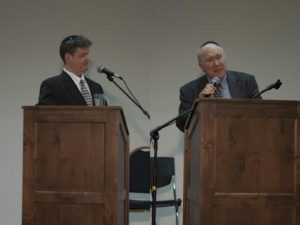The election may be over, but the conversation in the Jewish community about values and which elected officials best represent us continues on. At its most recent fundraiser, Kesher shed light onto the presidential race with a debate over the candidates’ positions on issues of primary importance to the Jewish community. These issues—and the organization that held this event—will be front and center in our community for years to come.
Jacoby’s and Luchins’ mutual respect and admiration was on display during the debate, which covered everything from Israel and Iran to fiscal and tax policy, core values, and the vitality of political bodies and processes. There were also deep Jewish currents throughout the debate. Jacoby began with a lengthy B’reishit d’rash, and later on both debaters interpreted the Yom Kippur Haftarah portion to support their arguments.
“I thought the debate was fabulous,” said Berel Simpser, head of Kesher. “It allowed our supporters to see totally committed Jews involved in the highest levels of society. It let them realize that Judaism and God and relevant to every aspect of public life.”
More than 100 supporters attended the event at the Minneapolis Jewish JCC, on top of dozens of individual and corporate sponsors. Kesher is a new organization run by Berel and Sara Simpser, formerly of Aish. They are committed to connecting Jews with Judaism, God and the land of Israel, creating innovative and inspiring conduits by which people can grow at their own pace.
Dr. Luchins showered Kesher with praise: “What they’ve done, presenting Judaism in a nonjudgemental way to the community, is needed, it’s overdue, it is essential and I am proud to be affiliated with them and I hope they raise lots of money!”
For Berel, the event was a big success because it created excitement and buzz. “Even if only 100 people showed up, more than 2,000 people got the invitation. I believe that our end of the year fundraising goal will be met, because the money is still out there to be collected.”
Kesher’s programs include relationship workshops (marriage and parenting), men’s scotch and study, a men’s mission trip to Israel, women’s programming, executive learning, relevant wisdom for living workshops, spiritual coaching and counseling, and Jewish pride retreats.
“We don’t want to teach you our Judaism, we want to help you with yours,” said Berel, who runs most of the educational programming. Both Berel and Sara are involved in vision and strategic planning, with Sara running public relations, publicity, and event planning.
“This event just shows that Jews of different opinions can come together in a supportive and positive, engaging way,” said Jacoby, “But the sad part is that people think Jews can only be Democrats.”

“–Or you have to vote Republican if you are orthodox,” added Dr. Luchins.
Jews support Democratic candidates at a higher rate than any other group of white voters, but according to Dr. Luchins, “a growing number of orthodox Jews are moving to the right—so I am here to educate them hopefully. The Republican party has shifted, and that shift is scary.”
Jacoby had his own reasons to be concerned: “The Obama idea is that there had not historically been enough space between the US and Israel.” Jacoby and Dr. Luchins touched on the incident surrounding language in the Democratic party platform regarding Jerusalem as the capital of Israel.
“I think it is a big mistake to make Israel a political football. Israel has bipartisan support and we cheapen it when we turn Israel into a political football,” pleaded Luchins. “Israel is not a primary issue and it should not be a factor in our voting.”
Eric Schwartz asked whether is it an insult to the Jewish community to assert that the US government is going to move its embassy to Jerusalem when that in all likelihood is never going to happen, and the debaters agreed that it is an insult.
According to Dr. Luchins, “Most Jews decide how they’re going to vote and then decide that their preferred candidate is the best for Israel. Israel is the excuse, not the reason, for the Jewish vote.”
Kesher conducted an exit poll in which attendees were asked, given the debate, how likely they were to explore the views of the candidate and party they had not supported when they walked in. Whether or not Kesher’s supporters changed their opinions of the candidates, there is no question that Kesher itself amplified its public image and capacity for increased support over the years to come.
*The FTC made me do it: Disclosure of Material Connection: TC Jewfolk received a free ticket to this debate in the hope that we would cover it on TC Jewfolk. But getting the ticket for free doesn’t mean that we were obligated to speak of it favorably. We are disclosing this in accordance with the Federal Trade Commission’s “Guides Concerning the Use of Endorsements and Testimonials in Advertising.”


